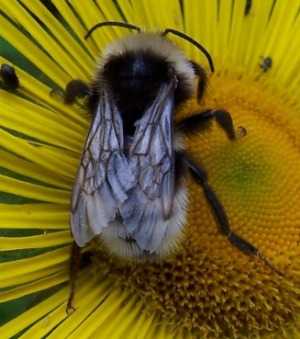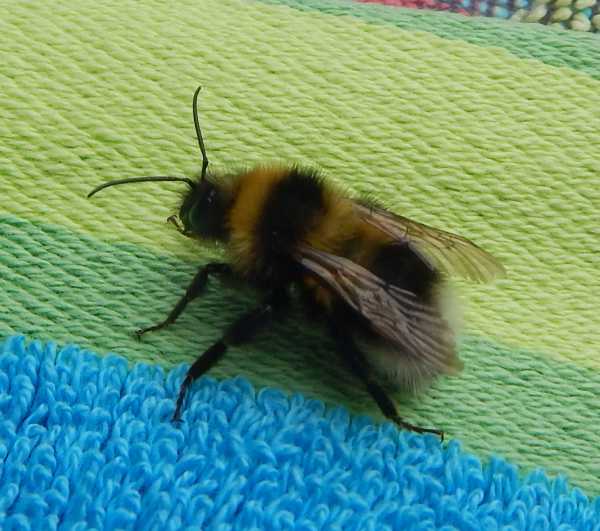Bombus barbutellus
(Barbut’s cuckoo bee)
Bombus barbutellus (Barbut’s cuckoo bee) is a cuckoo species that relies on target host bumble bee species to provide for and rear its young.
Bombus barbutellus - Barbut’s cuckoo bee appearance and life cycle
 Barbut’s cuckoo bee - Bombus barbutellus - male.
Barbut’s cuckoo bee - Bombus barbutellus - male.Females measure about 16 - 17mm in length1,2. Males are smaller, measuring about 13mm2.
There is some variation in appearance. In females, the tail is white and there is a well-defined yellow collar and a fringe of yellow hairs on the scutellum (the scutellum hair forms a midriff band at the thorax). Further pale, yellowish hairs form an indistinct band on the first abdominal segment. Unlike female social species of bumble bee, female cuckoos do not have corbicula (pollen baskets).
Males are similar to females, though they are smaller, and hairs on the scutellum may be more visible. Facial hairs on males are black, very dark or almost black.
Variations can occur in the width of the collar and extent of yellow hairs, and older sun-bleached males may have greyish collars and midriff bands in the summer.

Life cycle
Females can be seen from April to May, searching for the
nests of hosts which will already have emerged a little earlier from hibernation.
As they seek out a host, they may be witnessed flying low, exploring holes in banks or
around rough patches of vegetation.
Males may be seen in June and July up to August.
It's possible that the cuckoo females are initially attracted to scent trails that enable them to seek out their target host1.
According to Benton1, Sladen (author of 'The Humble Bee') reported that on inspection of a Bombus hortorum nest parasitized by Bombus barbutellus, the host queen was found dead inside the nest. The nest contained 49 workers that were offspring of the host, together with 16 females and 2 males of the Bombus barbutellus cuckoo. The nest also contained 5 cocoons of Bombus hortorum males among the remaining brood1. See - bumble bee life cycle.
The new cuckoo females are seen around June to July. As with other cuckoo species, there are no workers, and only reproductive females and males are reared.
Target host species and habitat
Benton and Falk suggest that target hosts are Bombus hortorum1,2 and Bombus ruderatus2.
However, other studies suggest that B. barbutellus may target additional host species, including B. hypnorum, B. pratorum, and B. argillaceus* and with further potential hosts also being: B. jonellus, B. distinguendus, B. pascuorum, B. ruderarius, and B. subterraneus3.
The Barbut's cuckoo bee is found in the same varied habitats as the hosts which includes open habitats with plenty of red clover, flowery arable margins and woodland edges, gardens and brownfield sites.
* Found in south and south-eastern Europe to western Asia. Not found in Britain.
Foraging Behaviour
Bombus barbutellus is polylectic (obtaining pollen from a variety of flowers across multiple plant genera and families); for example:
thistles,
white deadnettle,
vetches,
lavender,
bramble,
hawthorn,
Buddleia,
Ground-ivy,
knapweed,
and honeysuckle.
Status
Populations of Barbut's cuckoo bee are thought to be decreasing, nevertheless, the IUCN Red List categorizes Bombus barbutellus as being a species of 'Least Concern' (LC)3.
The IUCN status of confirmed hosts is as follows3:
- B. hortorum - LC - Stable
- B. ruderatus - LC - Decreasing
- B. argillaceus - LC - Stable
- B. hypnorum - LC - Increasing
- B. pratorum - LC - Increasing
References
1. Benton, Ted. Bumblebees: The Natural History & Identification of the Species Found in Britain. Collins 2006.
2. Field Guide to the Bees of Great Britain and Ireland by Steven Falk, Bloomsbury 2015.
3. Dozier, A.E., Straw, E.A. & Stanley, D.A. (2023) Systematic review of cuckoo bumblebee research reveals data gaps and understudied species. Ecological Entomology, 48(6), 636–649. Available from: https://doi.org/10.1111/een.13260
If you found this page helpful or interesting, I'd really be grateful if you would share it with others - if not this page, perhaps another, such as Gardening For Bees.
Thank you so much :) .